
Charles Edward Anderson Berry was an American singer, songwriter and guitarist who pioneered rock and roll. Nicknamed the "Father of Rock and Roll", he refined and developed rhythm and blues into the major elements that made rock and roll distinctive with songs such as "Maybellene" (1955), "Roll Over Beethoven" (1956), "Rock and Roll Music" (1957) and "Johnny B. Goode" (1958). Writing lyrics that focused on teen life and consumerism, and developing a music style that included guitar solos and showmanship, Berry was a major influence on subsequent rock music.
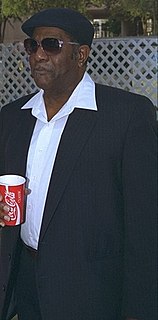
Johnnie Clyde Johnson was an American pianist who played jazz, blues and rock and roll. His work with Chuck Berry led to his induction into the Rock and Roll Hall of Fame. He was posthumously awarded the Congressional Gold Medal for breaking racial barriers in the military, as he was a Montford Point Marine - where the African-American unit endured racism and inspired social change while integrating the previously all-white Marine Corps during World War II.

"Johnny B. Goode" is a 1958 rock-and-roll song written and first recorded by Chuck Berry. Released as a single, it peaked at number two on Billboard magazine's Hot R&B Sides chart and number eight on its Hot 100 chart.

Beach Boys Concert is the first live album by American rock band the Beach Boys, released on October 19, 1964. It is their seventh album in all, and their third alone in the same year. It was their first of two chart-topping albums in the US, as well as the first live album to top pop music record charts, maintaining its position for four weeks during a sixty-two-week chart stay, and becoming another gold seller. Their other chart-topping album was the Endless Summer compilation in 1974.

"Roll Over Beethoven" is a 1956 hit single written by Chuck Berry, originally released on Chess Records, with "Drifting Heart" as the B-side. The lyrics of the song mention rock and roll and the desire for rhythm and blues to replace classical music. The title of the song is an imperative directed at the composer Ludwig van Beethoven to roll over out of the way and make room for the rock and roll music that Berry was promoting. The song has been covered by many other artists, including the Beatles and the Electric Light Orchestra. Rolling Stone magazine ranked it number 97 on its list of the "500 Greatest Songs of All Time".
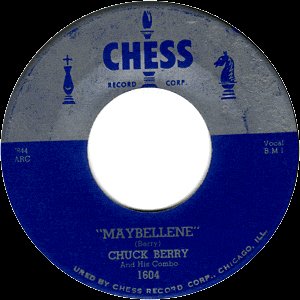
"Maybellene" is a rock and roll song. It was written and recorded in 1955 by Chuck Berry, adapted in part from the Western swing fiddle tune "Ida Red". Berry's song told the story of a hot rod race and a broken romance, the lyrics describing a man driving a V8 Ford and chasing his unfaithful girlfriend in her Cadillac Coupe DeVille. It was released in July 1955 as a single by Chess Records, of Chicago, Illinois. Berry's first hit, "Maybellene" is considered a pioneering rock and roll song. Rolling Stone magazine wrote of it, "Rock & roll guitar starts here." The record was an early instance of the complete rock and roll package: youthful subject matter; a small, guitar-driven combo; clear diction; and an atmosphere of unrelenting excitement.
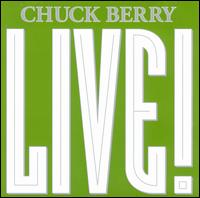
Live! is a live album by Chuck Berry, released in 1994 by Columbia River Entertainment Group.

Hail! Hail! Rock 'n' Roll is an album by Chuck Berry and soundtrack to the film of the same name, which was released in 1987 under record label, MCA. The album was recorded live at The Fox Theatre, St Louis, Missouri and Berry Park, Wentzville, Missouri on October 6 and October 16, 1986. The event was held to celebrate Berry's 60th birthday and it included several special guests. The album does not include the Berry song "School Days," which includes the line the album's title is derived from.

Live at the Fillmore Auditorium is the second live album by American musician Chuck Berry, backed by the Steve Miller Blues Band, released in September 1967 by Mercury Records.

The London Chuck Berry Sessions is an album of studio recordings and live recordings by Chuck Berry, released by Chess Records in October 1972 as LP record, 8 track cartridge and audio cassette. Side one of the album consists of studio recordings, engineered by Geoff Calver; side two features three live performances recorded by the Pye Mobile Unit, engineered by Alan Perkins, on February 3, 1972, at the Lanchester Arts Festival in Coventry, England. At the end of the live section, the recording includes the sounds of festival management trying in vain to get the audience to leave so that the next performers, Pink Floyd, can take the stage; the crowd begins chanting "We want Chuck!". His backing band were Onnie McIntyre (guitar), Robbie McIntosh (drums), Nic Potter (bass) and Dave Kaffinetti (piano). Both McIntosh and McIntyre would later form The Average White Band.
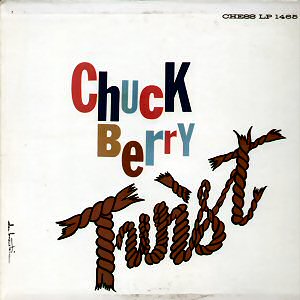
Chuck Berry Twist is the first compilation album by Chuck Berry, released by Chess Records in February 1962, during Berry's imprisonment. The title was an attempt to capitalize on a new dance craze, the Twist, introduced by Chubby Checker in 1960, even though none of the songs musically conformed to the Twist style. The album was reissued a year later with a new title, More Chuck Berry. An album with that title was released in the UK by Pye International Records in 1964, featuring the same cover but a completely different track listing.

Frederick Below, Jr. was an American blues drummer, best known for his work with Little Walter and Chess Records in the 1950s. According to Tony Russell, Below was a creator of much of the rhythmic structure of Chicago blues, especially its backbeat. He was the drummer on Chuck Berry's song "Johnny B. Goode".
Volume 2 is a vinyl anthology LP audio record of hit Chuck Berry recordings, made and printed in France on the "impact" Records label. In the 1970s, it was available for purchase in U.S. music stores, with a small adhesive sticker on the reverse of the album jacket stating, "Imported/Distributed" by Peters International, New York, N.Y.

Chuck Berry's Golden Decade is a compilation of music by Chuck Berry, released in three volumes in 1967, 1973, and 1974. Covering the decade from 1955 to 1964, each volume consists of a two-LP set of 24 songs recorded by Berry. The first volume reached number 72 on Billboard's Pop Albums chart. The second volume peaked at number 110. The third volume, which included only two hit singles among its tracks, did not chart.

Hail! Hail! Rock 'n' Roll is a 1987 documentary film directed by Taylor Hackford that chronicles two 1986 concerts celebrating rock and roll musician Chuck Berry's 60th birthday. A soundtrack album was released in October 1987 on the MCA label. The name comes from a line in Berry's song "School Days".
Chuck Berry – In Concert is an album by Chuck Berry, released in 2002 by Magnum Records.
"Let It Rock" is a song written and recorded by rock and roll pioneer Chuck Berry. Chess Records released it as single, which reached number 64 on the U.S. Billboard Hot 100 chart in February 1960. Chess later added it to Berry's album Rockin' at the Hops (1960). In 1963, Pye Records released it as a single in the UK, where it reached number six.
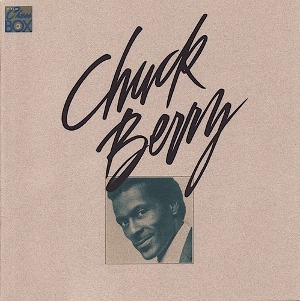
The Chess Box is a compact disc box set compilation by Chuck Berry. It is one in a series of box sets issued by MCA/Chess in the late 1980s. The Chuck Berry set is the most prominent of these, having won a Grammy Award for Best Historical Album in 1989. Berry's Chess Box was reissued on vinyl in 1990.
"Wee Wee Hours" is a song written and recorded by Chuck Berry in 1955. Originally released as the B-side of his first single, "Maybellene", it went on to become a hit, reaching number 10 in the Billboard R&B chart.

Chuck Berry's Golden Hits is the tenth studio album by Chuck Berry, released in 1967 by Mercury Records, his first for that label. It consists of new recordings of songs he had recorded for Chess Records and one new song. The re-recordings were performed with faster tempos and recorded in stereo. While the rest of Berry's albums for Mercury rest in obscurity, Golden Hits is still available.
















